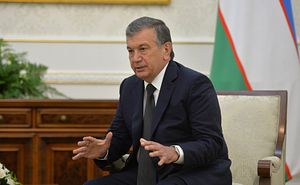This week the president of the European Bank for Reconstruction and Development (EBRD), Suma Chakrabarti, is making a three-day visit to Uzbekistan a month after a delegation visited to explore opportunities for revamping cooperation. The visit is a major signal that the troubles of 2003 may be firmly put in the past, opening a new chapter between the international financial institution and Uzbekistan.
According to the EBRD, “The visit will include high-level meetings with the authorities to discuss ways of increasing EBRD engagement with Uzbekistan.” The EBRD press release regarding the trip gracefully skims over the troubles between the organization and Tashkent, noting only that the EBRD has worked in the country since 1993, but “since 2010 there have been no fresh operations.”
“Uzbekistan is important for the successful regional cooperation and economic development of Central Asia,” Chakrabarti said. “I look forward to our dialogue and discussing ways of increasing the EBRD’s work in Uzbekistan where the Bank currently retains a small portfolio of projects. We already see several areas of interest, such as regional connectivity and integration, advisory services and finance for SMEs, and the financing of green energy and energy efficiency projects.”
With nearly €11.6 billion ($12.3 billion) committed to projects in the region, the EBRD is one of Central Asia largest investors. According to the bank, it has invested €894 million in Uzbekistan but at present only has a €8 million portfolio in the country.
For comparison, while both Tajikistan and Kyrgyzstan have had less cumulative EBRD investment than Uzbekistan, both under €700 million, the institution’s present portfolios in each country — €385 million and €268, respectively — far outstrip the bank’s present investments in Uzbekistan. The EBRD’s largest regional investment has been in Kazakhstan — €7.314 million cumulatively with a present portfolio worth €2.646 million. Even the value of the EBRD portfolio in isolated Turkmenistan is far beyond Uzbekistan at €44 million.
Relations between the EBRD and Uzbekistan soured majorly in 2003. The bank’s decision to host its 2003 annual meeting in Tashkent drew condemnation from an array of human rights organizations. Ahead of the meeting, the advocacy director of Human Rights Watch’s Europe and Central Asia division, Veronika Leila Szente Goldston, wrote a scalding commentary, asking, “Will this high-level gathering serve to promote political and economic reform in the host country, or reward one of the most repressive governments in the region?” Goldston and others highlighted that unlike other international financial institutions such as the World Bank and International Monetary Fund, the EBRD’s founding document includes a political mandate. The EBRD itself labels this a “unique mandate” in which it only assists countries “committed to and applying the principles of multi-party democracy [and] pluralism.”
“Uzbekistan satisfies none of these criteria,” Goldston wrote in 2003.
Goldston, and other human rights advocates, urged bank officials to press Uzbekistan on human rights both in private and to be “outspoken about human rights concerns at the meeting itself.”
EBRD officials did just that, with both then-EBRD President Jean Lemierre and the U.K.’s then-Development Minister Clare Short emphasizing the need for progress on human rights and a stout condemnation of torture, which a UN special rapporteur had said was a “systematic” issue in the country, in their public remarks.
As Human RIghts Watch noted following the meeting, “This amounted to a public scolding of President Karimov’s broken promise, and it did not go unnoticed. As Lemierre and Short delivered their critical speeches, President Karimov removed his headphones and demonstratively covered his ears.”
Karimov then failed to deliver his own condemnation of torture, which EBRD officials had hoped for. The bank gave Uzbekistan a year to improve the right situation and when it did not, began winding down its investments. According to Reuters, “by 2007 the flow of money for new projects in the country had dried up completely.”
Sources at the EBRD cited by Reuters said that Uzbekistan had invited the bank to return.
EBRD documents cite Rustam S. Azimov as the bank’s Uzbekistan governor. Azimov, floated as a possible Karimov successor, remains a key member of the government. Although he lost his post as finance minister in December, he remains deputy prime minister.
Chakrabarti’s visit to Uzbekistan will be carefully watched by both human rights groups and investors, the former hoping the EBRD can push the same message it did in 2003 but to more promising ends and the latter hoping the bank can pave a pathway to greater opportunities.

































